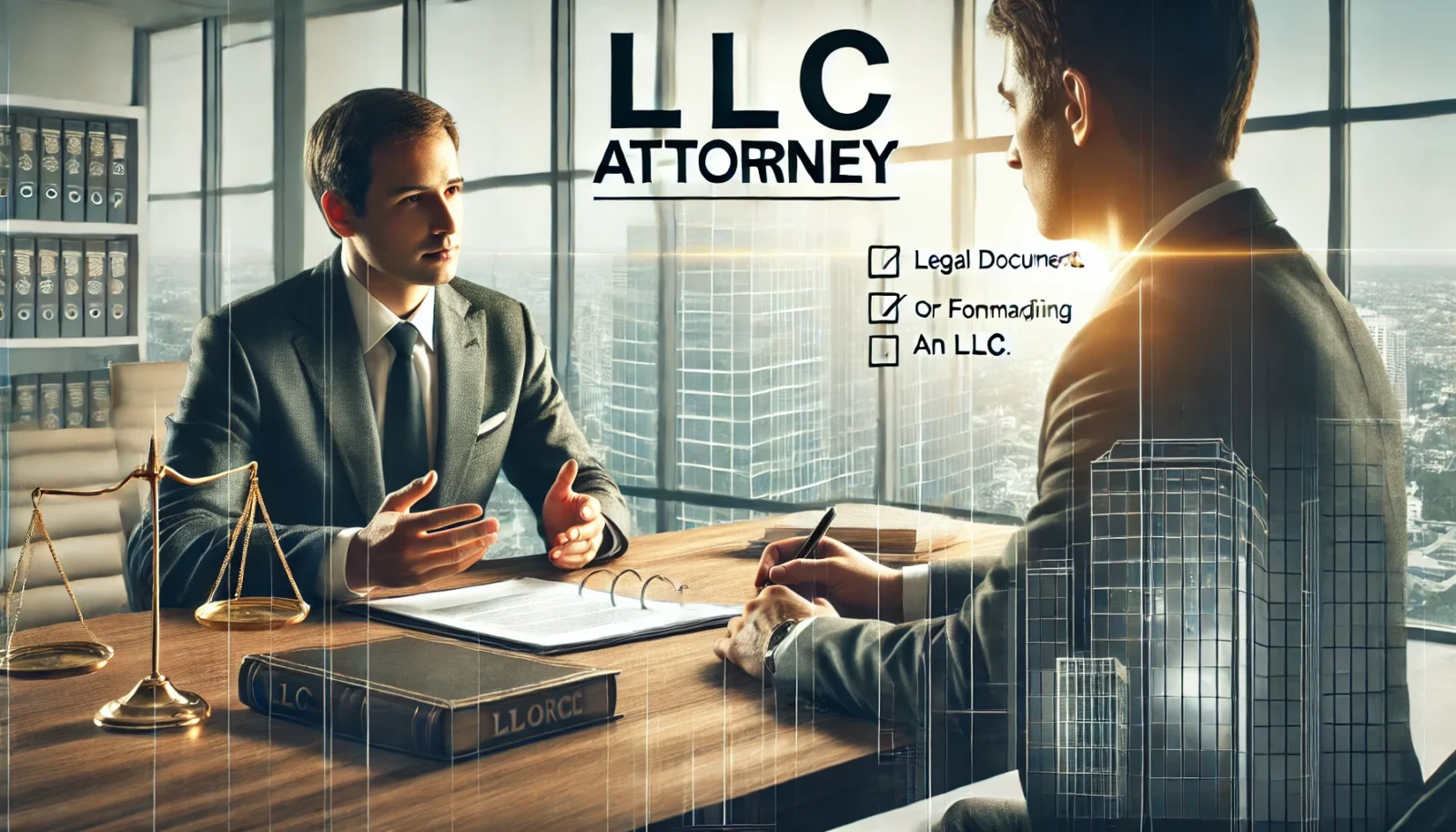Introduction
A Limited Liability Company (LLC) is a type of business structure that combines benefits of a corporation and a partnership. An LLC protects its owners from personal liability for business debts. This means if the business faces legal issues or debts, personal assets are usually safe. Legal guidance is crucial for forming and maintaining an LLC. Proper advice helps avoid mistakes that can lead to costly problems later. Many people do not understand the laws and rules governing LLCs. This is where a knowledgeable professional comes in. An LLC attorney can provide the expertise needed to navigate these complex issues. They assist with filing necessary documents and help create an operating agreement. This agreement outlines how the LLC will be run and how decisions will be made. Without proper legal help, businesses risk missing important compliance requirements. An attorney also helps protect the owners’ interests and ensures the LLC operates smoothly. Overall, having an attorney can make the difference between success and failure for an LLC. Their role is vital in setting up a strong foundation for the business.
What Does An Llc Attorney Do?
An LLC attorney offers a variety of legal services essential for business owners. Their primary role is to assist with the formation of an LLC. This includes filing necessary paperwork and ensuring all steps are completed correctly. An attorney also helps with drafting and reviewing operating agreements. These agreements define how the LLC operates and outline the roles of each member.
In addition to formation, an attorney provides guidance on compliance and regulations. This means keeping the business in line with state and federal laws. They ensure that all required filings are made on time, which helps avoid penalties.
When disputes arise among members or with outside parties, an LLC attorney offers representation in disputes. They advocate for the business’s interests and help resolve conflicts effectively. Whether negotiating settlements or representing the LLC in court, their expertise is invaluable. Overall, the support of an attorney is crucial for any LLC, as it helps navigate the complexities of running a business while minimizing legal risks.
Why You Need An Llc Attorney
Hiring an LLC attorney offers many benefits that can significantly impact your business. Professional legal assistance ensures that you follow the correct steps during formation. Many people try to create an LLC on their own, but there are common pitfalls in DIY LLC formation. Mistakes in paperwork or misunderstanding legal requirements can lead to serious problems, including fines or losing limited liability protection.
Compliance with state laws is crucial for any LLC. Each state has specific rules and deadlines for maintaining an LLC. An attorney helps ensure that you meet these obligations, preventing any legal issues that could arise from non-compliance. This support is vital in keeping your business operating smoothly and legally.
Another important reason to hire an attorney is to protect personal assets. An LLC provides liability protection, but only if it is set up and maintained correctly. An attorney can guide you in structuring your LLC to minimize risks. They help you navigate liability issues that could affect your personal finances. Overall, having an attorney is an investment in your business’s success and security.
How To Choose The Right Llc Attorney
Choosing the right LLC attorney is crucial for your business. Start by considering key factors like experience, specialization, and fees. Look for an attorney who has experience specifically in business law and LLC formation. Specialization in your industry can also be beneficial, as they may understand the unique challenges you face. Additionally, compare fees to ensure they fit your budget, but don’t choose solely based on price.
During consultations, ask important questions to assess their fit for your needs. Inquire about their experience with LLCs, their approach to handling legal issues, and how they stay updated on laws. It is also wise to ask about their communication style and availability. Clear communication is essential for a successful working relationship.
Client reviews and testimonials are also important in your decision-making process. Positive feedback from past clients can provide insight into the attorney’s reliability and effectiveness. Check online platforms or ask for references to gauge their reputation. Taking the time to find the right attorney can save you time and money in the long run, ensuring your LLC is well-supported.
Costs Associated With Hiring An Llc Attorney
When considering hiring an LLC attorney, it’s important to understand the various costs involved. Attorneys typically have different fee structures. Some charge hourly rates, which means you pay for the actual time spent on your case. Others may offer flat fees for specific services, such as forming an LLC or drafting an operating agreement. Knowing the fee structure helps you budget appropriately.
In addition to attorney fees, there may be additional costs. These can include filing fees required by the state for forming your LLC. If you need ongoing legal advice as your business grows, this will add to your expenses as well. It’s crucial to factor in these costs when planning your budget.
Conducting a cost vs. benefit analysis is essential when hiring an attorney. While there is an upfront cost, the long-term benefits often outweigh the expenses. A knowledgeable attorney can help you avoid costly mistakes, ensure compliance with laws, and provide peace of mind. Investing in professional legal support can ultimately protect your business and personal assets, making it a worthwhile decision.
The Llc Formation Process With An Attorney
The LLC formation process with an LLC attorney involves several important steps to ensure everything is done correctly. First, you will need to choose a unique name for your LLC. This name must comply with state regulations and be available for use. Once you have a name, the attorney will help you prepare and file the articles of organization. This document officially establishes your LLC with the state.
Next, an operating agreement is created. This key document outlines the management structure, member responsibilities, and how profits and losses will be shared. Even if not required by your state, having this agreement is crucial for clear communication among members.
The timeline for formation can vary depending on your state’s processing times. Generally, it can take anywhere from a few days to several weeks to finalize the formation. Your attorney will help monitor the status and ensure all requirements are met. Throughout this process, their guidance ensures compliance with all legal regulations, helping you start your business on a solid foundation. Having an attorney involved can streamline the process and minimize potential issues.
Common Legal Issues Faced By Llcs
LLCs often encounter various legal challenges that can affect their operations. One common issue is disputes among members. Conflicts can arise due to differing opinions on business decisions or profit distribution. Having clear guidelines in the operating agreement can help resolve these disputes, but sometimes legal intervention may be necessary.
Another significant concern is compliance with state and federal regulations. LLCs must adhere to specific laws that vary by state, including filing deadlines and tax obligations. Failure to comply can result in penalties or even dissolution of the LLC. An attorney can help ensure that all compliance requirements are met.
Intellectual property concerns also pose risks for LLCs. Protecting trademarks, copyrights, and patents is crucial for maintaining a competitive edge. Without proper protection, businesses may face infringement issues or loss of valuable assets.
Additionally, contractual obligations and disputes are common. LLCs often enter into contracts with clients, suppliers, or partners. Misunderstandings or breaches can lead to legal battles, which can be costly and time-consuming. An attorney can assist in drafting contracts that minimize risks and provide representation if disputes arise.
Conclusion
Hiring an LLC attorney is essential for any business owner looking to establish and maintain a successful LLC. Their expertise in navigating the complexities of business law ensures that your LLC is set up correctly and remains compliant with all regulations. From helping with formation to resolving disputes, an attorney provides invaluable support that can save time, money, and stress.
Legal advice is not just about avoiding pitfalls; it’s also about positioning your business for success. An attorney can guide you through key decisions and help protect your interests. By investing in professional legal assistance, you lay a strong foundation for your business.
If you are starting or managing an LLC, don’t hesitate to seek legal advice. It can make a significant difference in achieving your business goals and safeguarding your personal assets. Remember, a well-supported LLC is a step towards long-term success.
Faqs About Llc Attorneys
What Qualifications Should An Llc Attorney Have?
An LLC attorney should have a law degree and be licensed to practice in your state. Look for someone with specific experience in business law, especially with LLCs. Additional certifications or specializations in corporate law can also be beneficial.
Can I Form An Llc Without An Attorney?
Yes, you can form an LLC without an attorney. However, it is often risky. Many people encounter pitfalls in the process, such as incorrect paperwork or missing important steps. Professional guidance helps ensure that your LLC is set up correctly and legally.
How Long Does It Take To Form An Llc With An Attorney?
The timeline for forming an LLC can vary based on your state’s processing times. Typically, it can take anywhere from a few days to several weeks. An attorney can help speed up the process by ensuring all documents are completed and submitted accurately.
What Are The Ongoing Legal Services An Llc Attorney Can Provide?
An LLC attorney can offer various ongoing services. These include compliance checks, assistance with contracts, guidance on regulatory changes, and representation in disputes. They can also help with amending operating agreements and managing any legal issues that arise as your business grows.
To read more, visit our blog page. We do have more topics!










Got a Questions?
Find us on Socials or Contact us and we’ll get back to you as soon as possible.